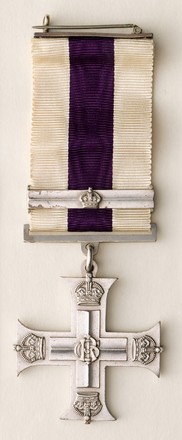Maxwell’s first medal was the Distinguished Conduct Medal:
"This warrant-officer took command of a platoon and led it forward with great dash. On one of our strong points being heavily barraged, he went forward on his own initiative and moved the men forward clear of the barrage, during which operations only one casualty was sustained. The action of this warrant-officer undoubtedly saved many lives. Throughout the operations he carried out his duties with great skill, and was a source of great inspiration by his splendid example".1
He was promoted to company sergeant major and then to second lieutenant and lieutenant in January 1918. Soon after in March 1918 he was awarded the Military Cross for leading a successful attack on German troops when leading a scouting patrol east of Ploegsteert:
"For conspicuous gallantry and devotion to duty. While in command of a patrol he observed a party of about fifty of the enemy entering a disused trench. He attacked them with bombs and rifle fire, and then assaulted the position and captured a prisoner. He showed splendid initiative and determination".2
He was awarded a Bar to his Military Cross for actions in August, during the Allied offensive near Rainecourt:
"For conspicuous gallantry and devotion to duty in the advance at Rainecourt on 9th August 1918. Within thirty minutes of zero he was the only officer left with his company, but kept his men well in hand, notwithstanding machine gun fire, besides fire from an anti-tank gun and a battery of 77 mm. He was close to a tank which was struck by a shell and set on fire, and, though shaken by the explosion, he rushed to the doors and opened them in time for the crew to escape. He showed a fine example of courage and presence of mind".3
Maxwell received the nation’s highest military honour, the Victoria Cross:
"For most conspicuous bravery and leadership in attack on the Beaurevoir-Fonsomme line, near Estrees, north of St. Quentin, on the 3rd October, 1918. His company commander was severely wounded early in the advance and Lieutenant Maxwell at once took charge. The enemy wire when reached under intense fire was found to be exceptionally strong, and closely supported by machine guns, whereupon Lieutenant Maxwell pushed forward single handed through the wire andcaptured the most dangerous gun, killing three and capturing four enemy. He thus enabled his company to penetrate the wire and reach the objective. Later, he again dashed forward and silenced, single handed, a gun which was holding up a flank company. Subsequently, when with two men only he attempted to capture a strong party of the enemy, he handled a most involved situation very skillfully, and it was due to his resource that he and his comrades escaped.Throughout the day Lieutenant Maxwell set a high example of personal bravery, coupled with excellent judgment and quick decision."4
Footnotes
1. Commonwealth Gazette, No 95, 27 June 1918
2. Commonwealth Gazette No 165, 24 October 1918
3. Commonwealth Gazette No 67, 3 June 1919
4. Commonwealth Gazette No 61, 23 May 1919



 Back to list
Back to list